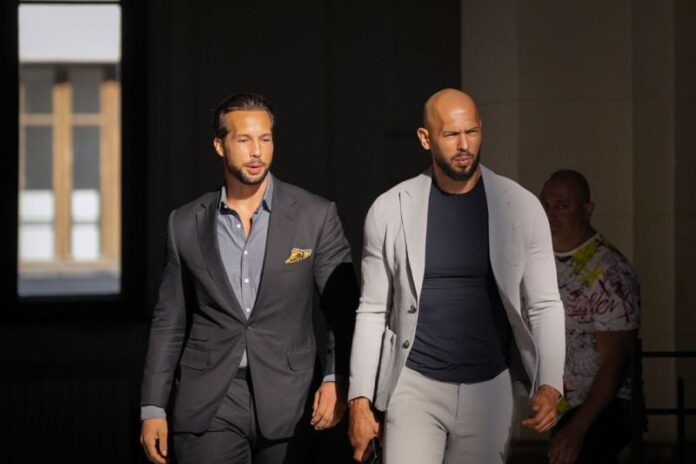Accused of rape, continuous human trafficking and using violence to exploit their victims, brothers Andrew and Tristan Tate benefit from a completely secretive justice system in Romania that protects them from the public eye.
Romanian magistrates, whether in lower courts or the Bucharest Court of Appeal, have chosen to review each of the cases against the Tate brothers with a lock on the court door. Moreover, the judges reject any press requests related to the cases, even those that are not related to victims who could be exposed, but only to the impressive wealth the two brothers have built in Romania from illegal activities.
The cases are of public interest and publicizing them is paramount because it would help not only society but primarily potential new victims to recognize the traffickers’ modus operandi and avoid falling into their trap.
Let’s not forget that the sex trafficking and exploitation network run by the Tate brothers was only able to operate thanks to the public image that the two men displayed, including on social media, where they were seen as wealthy businessmen, role models who enjoyed a good reputation even among celebrities.
This secrecy of the courts in favour of the Tate brothers helps the two to further cultivate their image as influential figures with high-level protection, which is only likely to intimidate victims and witnesses in cases against them.
The president of the court is ruler on the case without having to give any reasoning. This secrecy is the word that also describes the decision of the Bucharest Court of Appeal to reject the Sursa Zilei’s request for the full ruling that was conducted on 8 January this year, which lifted the freeze on Andrew Tate’s several assets, including his luxury cars.
Andrew and Tristan, as well as three associated companies, were parties to the appeal who won at the Bucharest Court of Appeal. They are SC Ground Breaking Development SRL, Talisman Enterprises SRL and The Cannon Run Limited.
The judgment of the Court of Appeal squashes the previous attachment order and remits it for retrial.
After drafting the decision, the president of the complete of the First Penal Division of the Bucharest Court of Appeal rejected Sursa Zilei’s request, citing the Good Practice Guidelines on relations between the judiciary and media representatives, adopted by the Superior Council of Magistrates (SCM) in 2019.
The judge – president of the complete has specifically invoked article 48 of the Guide, which refers to Article 46 of the same Guide, namely:
„(1) Representatives of the media may consult the files pending before the courts, subject to compliance with the order of request and measures to ensure the integrity of documents and only to the extent that it is possible to make them available. The request shall be approved by the court spokesperson in consultation with the President of the panel or, in his absence, the President of the court.
(2) Refusal to inspect the file may be justified by the exceptions referred to in article 46 and shall always be justified.” In other words, the president of the panel is the ruler in the matter and has ruled that the requested document cannot be made available to the press because, as stated in paragraph 2 of article 48 and according to article 46, „the provision of information of public interest concerning judicial activity may be restricted in the interests of morality, public order or national security or when the interests of minors or the protection of the privacy of the parties to the proceedings or other persons so require. The right of free access to information of public interest may also be restricted where, in special circumstances, the court considers that publicity would be likely to prejudice the administration of justice”.
As the requested decision concerned a lifting of a seizure and did not concern public order, national security, morality, the interests of minors or the private life of the parties to the proceedings, we understand that „the court, i.e. the president of the panel, considers that publicity would be likely to prejudice the course of justice”.
As long as the judge did not give reasons for his decision rejecting the request, although he was obliged under Article 48(2)(b) of Good Practice Guidelines to do so, we can understand anything.
The Supreme Council of the Magistrates should review the Good Practice Guidelines by which it has conferred full sovereignty to the judges who prevent the press from serving the public interest, unjustifiably, but invoking provisions they themselves violate.
Raluca Dan


